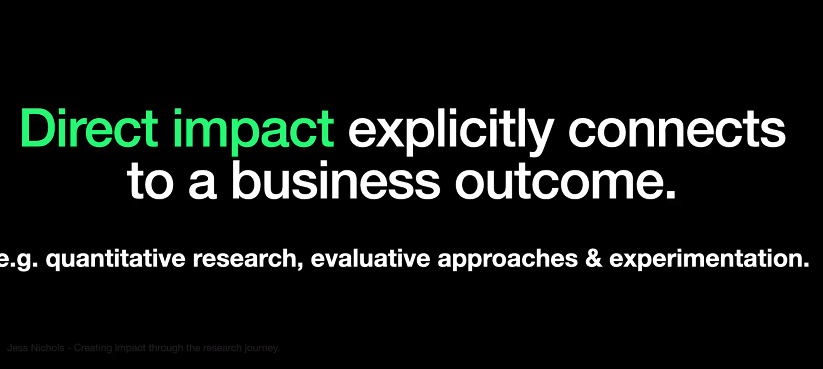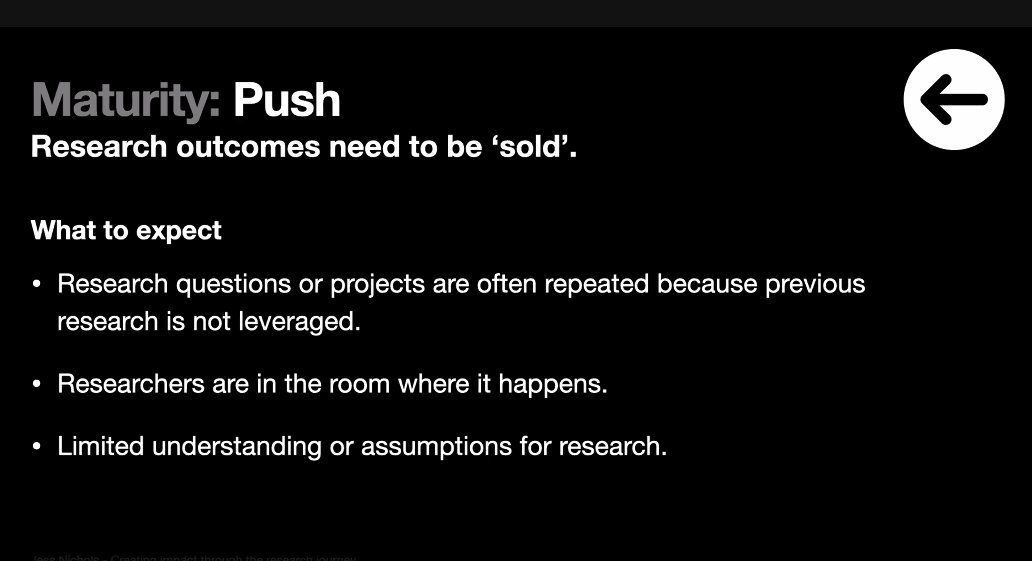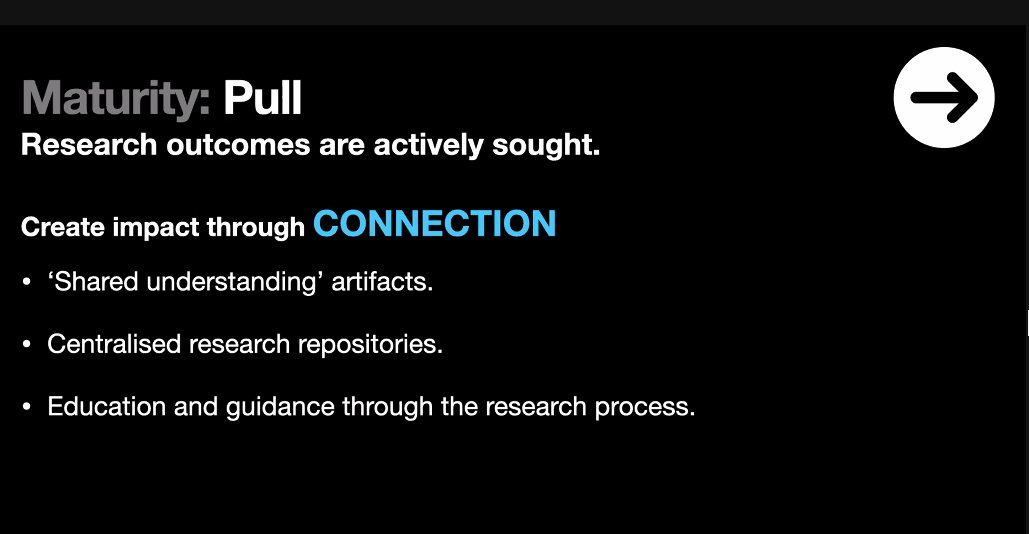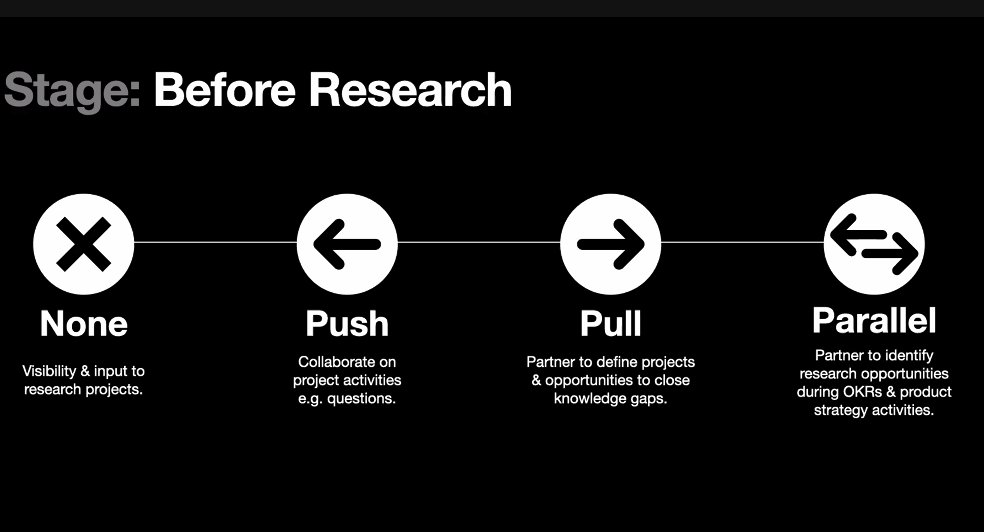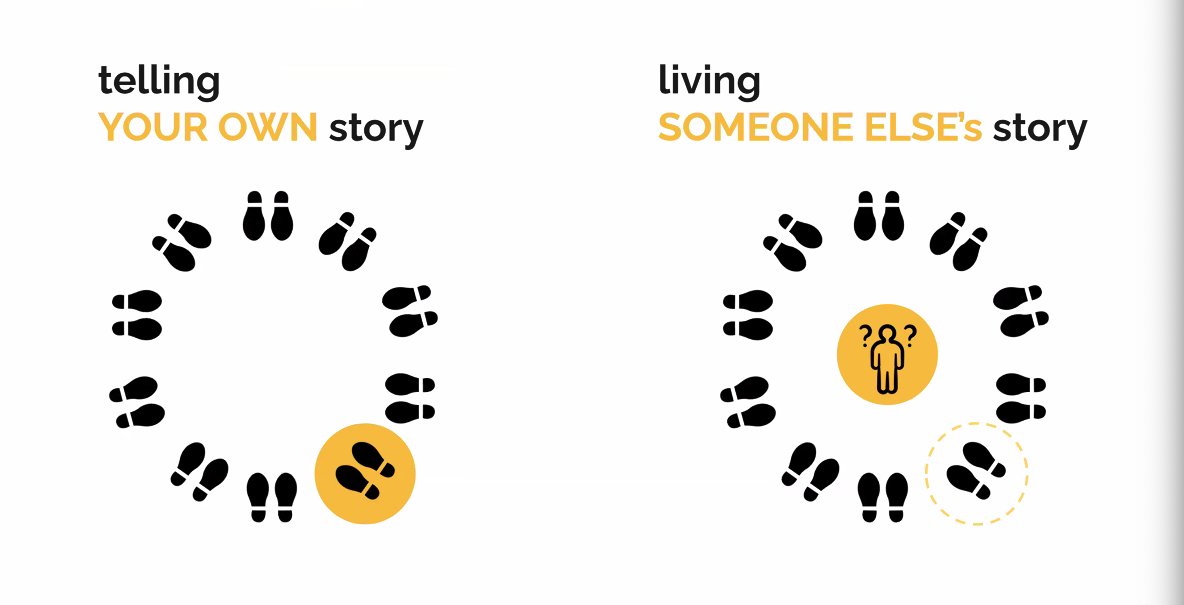
Next up!
Jess Nichols, Manager User Experience Research at A Cloud Guru
— Creating Impact through the Research Journey
#dr2021
Jess Nichols, Manager User Experience Research at A Cloud Guru
— Creating Impact through the Research Journey
#dr2021
One of the most complicated parts of being a researcher is creating an impact with your work.
It happens early in the research process.
It happens early in the research process.
Jess is talking about the changing accountability from a consultant to an in house research team
Jess did a brief with the PM and disappeared to complete the research.
Big issues she uncovered were HR and legal issues, her report was hidden away by the organisation to deal with the issues.
Big issues she uncovered were HR and legal issues, her report was hidden away by the organisation to deal with the issues.
Research is a partnership, you can't do it alone and not take people along with them.
There should be no surprises in research.
The unknown can be uncomfortable, and that's not a feeling we want our stakeholders to have.
By the time you're sharing your findings the team should know your outcomes and recommendation and they should have contributed
The unknown can be uncomfortable, and that's not a feeling we want our stakeholders to have.
By the time you're sharing your findings the team should know your outcomes and recommendation and they should have contributed
How can research define impact?
Because research is interwoven into the fabric of decision making it can be hard to articulate.
Because research is interwoven into the fabric of decision making it can be hard to articulate.
There are two types of impact for researchers
Direct impact & Indirect impact
Direct impact & Indirect impact
Indirect Impact
Most qualitative research will fall into this space.
There's an emphasis on the long game to get the teams to buy into research to influence their decision making.
Most qualitative research will fall into this space.
There's an emphasis on the long game to get the teams to buy into research to influence their decision making.

You need to be proactive in defining the impact at the beginning of the subject.
Why are you doing it?
What decisions will it help you make?
if these aren't clear you probably shouldn't do research
Why are you doing it?
What decisions will it help you make?
if these aren't clear you probably shouldn't do research
Review the organisations OKR's KPI's or roadmap to help tie opportunities to research.
There will be open questions or limited confidence in these outcomes.
This is a huge opportunity for you to show the value of research by mitigating business risk.
This is a huge opportunity for you to show the value of research by mitigating business risk.
Research maturity influences the impact.
Low maturity will likely have different expectations of the impact of research.
High maturity will likely know research is fuzzy and can be used to influence product decisions.
Low maturity will likely have different expectations of the impact of research.
High maturity will likely know research is fuzzy and can be used to influence product decisions.
The maturity model helps you assess which approached will be most impactful to the teams you work with.
The more maturity, the more involvement the team can have.
The more maturity, the more involvement the team can have.
There isn't a one size fits all approach, you have to think about the best stage and way to engage with teams to make sure your research is impactful.
You can reduce the level of surprise for your teams.
— Find out how you can relieve pressure on you team
— Be transparent & explain the research process
— Share your insights early & often with the team
— Share clear and actionable insights
— Create moments that matter
— Find out how you can relieve pressure on you team
— Be transparent & explain the research process
— Share your insights early & often with the team
— Share clear and actionable insights
— Create moments that matter
Make your stakeholders care about research so you can make impact.
If you're at a high level of maturity you will have more demand for research than the team has capacity for.
A researcher should only work on the most impactful research.
A researcher should only work on the most impactful research.
Research priority matrix
How much ambiguity is there in the problem space?
You create huge impact making the fuzzy clear
How much ambiguity is there in the problem space?
You create huge impact making the fuzzy clear

Delegate projects that do not increase your own influence or impact.
It can dilute you're ability to be valuable as a researcher
It can dilute you're ability to be valuable as a researcher
The scope of the project needs to be clear with minimal ambiguity.
Make sure you have an over-feasible timeline, 120%ish of the actual time it would take to run.
Make sure you have an over-feasible timeline, 120%ish of the actual time it would take to run.
If you're building on existing knowledge it's a good project to delegate
The projects you delegate must be set up for success with limited guidance and guardrails.
The projects you delegate must be set up for success with limited guidance and guardrails.
To have successful research projects you need to learn to say no.
Consider no when:
You don't think the project will be successful.
It's beet to have no insights than bad insights.
Discuss what tradeoffs you can make.
You don't think the project will be successful.
It's beet to have no insights than bad insights.
Discuss what tradeoffs you can make.
If a project topic already has a lot of existing research.
or go look at the previous research and come back.
or go look at the previous research and come back.
If there is a high level of confidence in an outcome already, say no.
Just trust your gut. Yu'll never be 100% sure.
Just trust your gut. Yu'll never be 100% sure.
Research isn't there to check a box.
Everyone that runs research should be successful and create impact.
THe more people who have a positive experience with research the more likely they will become research advocates.
It won't happen over night.
It's never "completed".
Celebrate the impact, no matter how small!
THe more people who have a positive experience with research the more likely they will become research advocates.
It won't happen over night.
It's never "completed".
Celebrate the impact, no matter how small!
You're going to learn the most when you screw up!
test and learn through your journey, and give yourself permission to fail.
Creating impact through research is a marathon, not a sprint.
test and learn through your journey, and give yourself permission to fail.
Creating impact through research is a marathon, not a sprint.
@threadreaderapp unroll please
• • •
Missing some Tweet in this thread? You can try to
force a refresh
